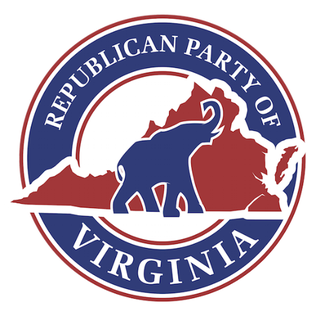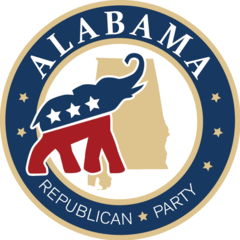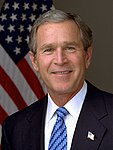
The Republican National Convention (RNC) is a series of presidential nominating conventions held every four years since 1856 by the Republican Party in the United States. They are administered by the Republican National Committee. The goal of the Republican National Convention is to officially nominate and confirm a candidate for president and vice president, adopt a comprehensive party platform and unify the party, as well as publicize and launch the fall campaign.

The Kansas Republican Party is the state affiliate political party in Kansas of the United States Republican Party. The Kansas Republican Party was organized in May 1859.

The Republican Party of Virginia (RPV) is the Virginia chapter of the Republican Party. It is based at the Richard D. Obenshain Center in Richmond. As of May 2024, it controls all three statewide elected offices and 5 out of 11 U.S. House seats.
The California Republican Party (CAGOP) is the affiliate of the United States Republican Party in the U.S. state of California. The party is based in Sacramento and is led by chair Jessica Millan Patterson.
The Utah Democratic Party is the affiliate of the Democratic Party in the U.S. state of Utah. The party describes itself as a big tent party.
The Texas Democratic Party is the affiliate of the Democratic Party in the U.S. state of Texas and one of the two major political parties in the state. The party's headquarters are in Austin, Texas.

The Alabama Republican Party is the state affiliate of the Republican Party in Alabama. It is the dominant political party in Alabama. The state party is governed by the Alabama Republican Executive Committee. The committee usually meets twice a year. As of the February 23, 2019 meeting in Birmingham, the committee is composed of 463 members. Most of the committee's members are elected in district elections across Alabama. The district members are elected in the Republican Primary once every four years, with the most recent election for the committee having been on June 5, 2018. The new committee takes office following the general election in November 2018. In addition, all 67 county GOP chairmen have automatic seats as voting members. The state chairman can appoint 10 members. Each county committee can appoint bonus members based on a formula that theoretically could add 312 seats, although that formula currently calls for only about 50 seats.

The Montana Republican Party (MTGOP) is the affiliate of the Republican Party in Montana. It is headquartered in Helena.

The Republican Party of New Mexico is the affiliate of the United States Republican Party in New Mexico. It is headquartered in Albuquerque and led by chairperson Steve Pearce, vice chair Frank Trambley, secretary Mari Trujillo Spinelli, and treasurer David Chavez.

The Vermont Republican Party is the affiliate of the Republican Party in Vermont and has been active since its foundation in the 1860s. The party is the second largest in the state behind the Vermont Democratic Party, but ahead of the Vermont Progressive Party. The party historically dominated Vermont politics until the mid-20th century, but was replaced by the Vermont Democratic Party. The party currently has very weak federal electoral power in the state, controlling none of Vermont's federal elected offices. The only statewide office that the party currently controls is the governorship, held by Phil Scott.

In 2008, Virginia, for the first time since 1964, cast its electoral college presidential votes for a Democrat, Barack Obama. It also elected a United States senator, members of the United States House of Representatives, and local officers such as county board and school board members.

The 2016 United States Senate election in Connecticut was held November 8, 2016, to elect a member of the United States Senate to represent the State of Connecticut, concurrently with the 2016 U.S. presidential election, as well as other elections to the United States Senate in other states and elections to the United States House of Representatives and various state and local elections.

The 2018 general election was held in the U.S. state of Texas on November 6, 2018. All of Texas's executive officers were up for election as well as a United States Senate seat, and all of Texas's thirty-six seats in the United States House of Representatives. The Republican and Democratic Parties nominated their candidates by primaries held March 6, 2018. Convention Parties nominated their candidates at a series of conventions. County Conventions held March 17, 2018, District Conventions held March 24, 2018, and a State Convention held April 14, 2018. At the present time there is only one Convention Party in Texas, that is the Libertarian Party. Other parties may seek to achieve ballot access.

William Richardson Timmons IV is an American attorney, entrepreneur, and politician serving as the U.S. representative for South Carolina's 4th congressional district since 2019. His district is in the heart of the Upstate and includes Greenville, Spartanburg, and most of their suburbs. A member of the Republican Party, Timmons served as the South Carolina state senator from 2016 to 2018.

The 2020 United States presidential election in Virginia was held on Tuesday, November 3, 2020, as part of the 2020 United States presidential election in which all 50 states plus the District of Columbia participated. Virginia voters chose electors to represent them in the Electoral College via a popular vote, pitting the Republican Party's nominee, incumbent President Donald Trump, and running mate Vice President Mike Pence against Democratic Party nominee, former Vice President Joe Biden, and his running mate California Senator Kamala Harris. Virginia has 13 electoral votes in the Electoral College.

The 2020 United States presidential election in Nevada was held on Tuesday, November 3, 2020, as part of the 2020 United States presidential election in which all 50 states plus the District of Columbia participated. Nevada voters chose electors to represent them in the Electoral College via a popular vote, pitting the Republican Party's nominee, incumbent President Donald Trump, and running mate Vice President Mike Pence against Democratic Party nominee, former Vice President Joe Biden, and his running mate California Senator Kamala Harris. Nevada has six votes in the Electoral College.

The 2020 Oregon Democratic presidential primary took place on May 19, 2020 in the Democratic Party primaries for the 2020 presidential election and was the only contest on that date. The Kentucky primary, previously also scheduled for May 19, was delayed due to the coronavirus pandemic, while Oregon already had a total vote-by-mail primary. The Oregon primary was a closed primary and awarded 74 delegates to the 2020 Democratic National Convention, of whom 61 were pledged delegates allocated on the basis of the primary results.

The 2022 Minnesota gubernatorial election took place on November 8, 2022, to elect the governor of Minnesota. Incumbent Democratic (DFL) Governor Tim Walz defeated the Republican nominee, former state senator Scott Jensen, winning a second term.

The 2024 United States presidential election in Texas is scheduled to take place on Tuesday, November 5, 2024, as part of the 2024 United States elections in which all 50 states plus the District of Columbia will participate. Texas voters will choose electors to represent them in the Electoral College via a popular vote. The state of Texas has 40 electoral votes in the Electoral College, following reapportionment due to the 2020 United States census in which the state gained two seats.
The following is a list of events of the year 2022 in Texas.




























